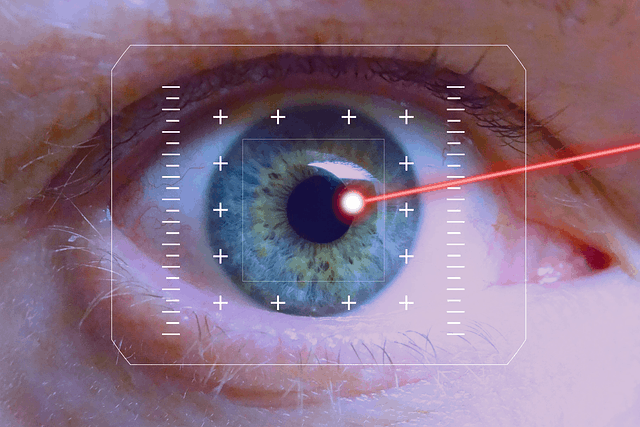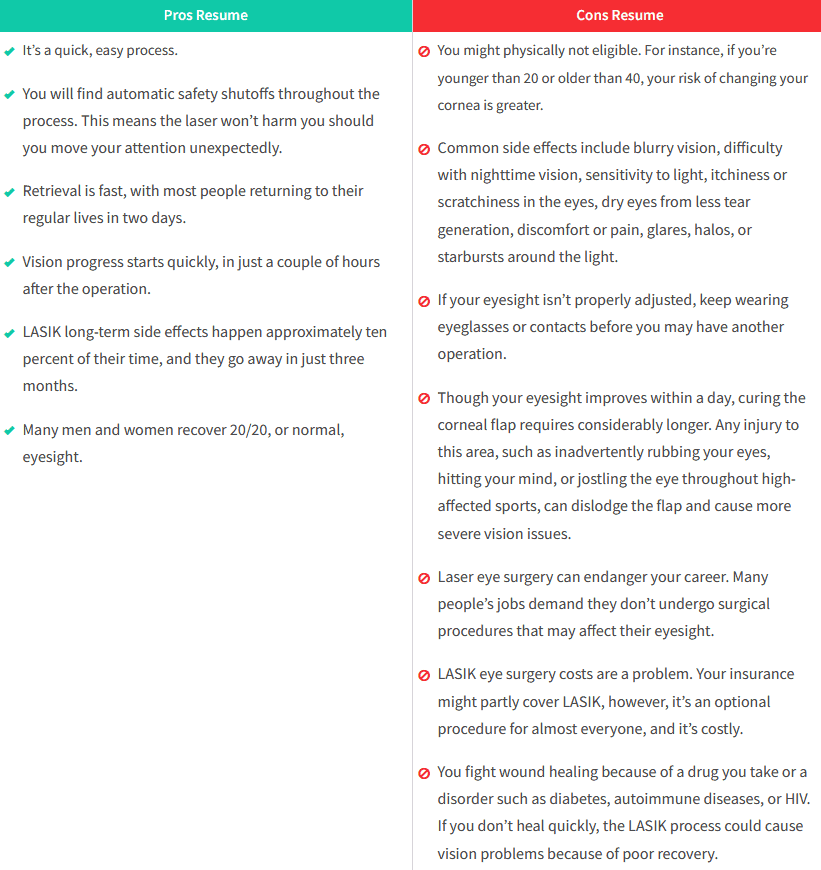
Lasik eye surgery is a simple yet powerful procedure that will change your life.
LASIK permanently changes the shape of your eyes, so you can see better. Millions of people have undergone this procedure, but you shouldn’t decide to get it until you know all the facts.
Without eyeglasses, the world appears blurry and distorted. But when you see clearly, life is much better. Lasik eye surgery promises to give you that crystal-clear vision again. Let’s find out how this process works!
Contents
What Is LASIK Technology? A Guide To Seeing Life More Clearly.
LASIK is a laser-assisted eye surgery that corrects vision problems like myopia (nearsightedness) or hypermetropia (farsightedness). The procedure is often referred to as LASEK for LAser-assisted in situ keratomileusis.
The laser enhances your eyesight by repairing refractive errors you have been born with, or that may have grown over time.
The refractive process decreases or eliminates a patient’s dependence on contact lenses and glasses, enhancing eyesight by repairing errors caused by:
- Astigmatism,
- Nearsightedness (Myopia),
- Farsightedness (hyperopia),
- Presbyopia (farsightedness from aging).
Using lasers, doctors will shave cells off the surface of your cornea, making a smoother corneal surface that will bend light properly.

LASIK can fix eyesight if you meet the prerequisite criteria, including being younger than 50 and having healthy eyes. LASIK is an alternative to wearing corrective eyeglasses or contact lenses, but before undergoing this surgical procedure, consider that it might have rare complications, including partial loss of eyesight.
You need to know that there can be dangers to LASIK, so it is important to understand the potential problems. Possible side effects may range from mild to severe.
Because LASIK is a surgery, there are risks involved. The most common side effects of the procedure tend to be halos around lights, glare, and dry eyes. However, there are rare cases in which even people with health issues can benefit from this surgery if they have 20/20 vision or feel that their quality of life would greatly improve without needing to wear contact lenses or glasses.
Luckily, LASIK is now getting more widespread, so you’ll have a lot more options when it comes to deciding on a surgeon.
The FDA has approved LASIK to correct vision issues since 1999. Surgery centers perform about 600,000 LASIK procedures in the US each year.
How much does LASIK eye surgery cost?
LASIK eye surgery is a common source of financial confusion for many people — especially those who aren’t aware of its high cost. In this section, we’ll answer the question, “how much does LASIK cost?”
LASIK surgery is generally covered by insurance plans and paid for out-of-pocket by patients in only 35 percent of cases. Most people who need LASIK surgery have to pay thousands of dollars out of pocket — even if they have insurance.
Many resources online can help you compare LASIK prices with other surgeons in your area.
You can also find out which surgeons offer LASIK at discounted rates by searching “LASIK surgery” on Google or in local directories like YellowPages.com.
The average cost of LASIK varies widely depending on where you go for the procedure and what kind of results you desire. According to the American Society for Surgery of the Eye, the average price for LASIK is $1,000. The lowest reported cost was $150, but that surgeon doesn’t have much experience with laser vision correction.
In most cases, LASIK is covered by Medicare, but you should check with your insurance company to ensure you’re not responsible for a co-pay or deductible.
Costs vary depending on how you pay. In some cases, providers may bill Medicare directly if one of the following factors applies to you:
- You’re over age 65 and have Medicare Parts A and B.
- You are a recipient of Social Security Disability Insurance, Supplemental Security Income, or SSI (cash benefits).
- Likewise, you’re a patient in a hospital or skilled nursing facility.
- You’re a kidney patient.
Suppose you have no insurance coverage or rely solely on Medicare or Medicaid coverage. In that case, you might still be able to get LASIK through a low-cost health plan or other types of government assistance programs like the Veteran’s Administration or TRICARE.
You can find the best prices at low-volume surgeons and clinics.
Is LASIK safe long-term?
The procedure, performed under local anesthetic, involves using instruments to cut a flap of tissue from the back of your eye and place it over the front. The flap then reshapes itself into the desired shape, correcting your vision.
The American Academy of Ophthalmology says that some people may not see as well after the procedure.
The good news is that the academy says it’s “not yet aware of any long-term complications of LASIK,” so if you’re considering having LASIK surgery, that’s a good sign.
LASIK is generally safe, but you should consider some potential side effects before you decide to undergo the operation.
- Blurred vision. This is usually temporary and will resolve itself over time as your eye’s natural cornea heals itself.
- Dry eyes. This can occur in most patients who have experienced dry eye symptoms before LASIK surgery.
- Eye infection or dry socket. A dry socket occurs when part of the inner ear is exposed after having surgery.
Dr. Edward Manche, ophthalmology professor and chief of Cornea and Refractive Surgery at Stanford University School of Medicine, says that the FDA has reaffirmed LASIK’s safety: “There are certain people who have had some issues, but the great majority of individuals do exceptionally well,” he states.

LASIK Surgery Pros and Cons
When it comes time to decide whether you should get LASIK surgery, there are many things to think about. Like any medical procedure – it can have both good and bad outcomes.
Is LASIC a Good Idea? — Pros & Benefits
LASIK eye surgery is quick and secure
Performed as an outpatient procedure, LASIK may take roughly 20 minutes, and the staff at the clinic spend all of that time getting you ready to set up.
Recipients who stay alert may be granted a Valium to calm their nerves. For security and reassurance, the laser is intended to shut off when your patient’s eye makes any sudden moves that could prompt malfunction or harm.
Results come fast
It does not take long to gain clear sight. LASIK patients will see a difference in a couple of hours. You will see very well by the following day.
Those who get PRK can expect a higher recovery – roughly a month – and a little slight pain because of the corneal surface elimination.
You’re able to live a life without glasses
Whether they select LASIK or PRK, many individuals see that possibility as life-changing – along with a way to enjoy even fundamental tasks that poor eyesight once had been shrouded.
Laser eye surgery can improve your vision
LASIK recipients can recover 20/20 eyesight. Just don’t expect extraordinary sights. You are likely to receive everything you may get with eyeglasses or contact lenses.
Reasons You Shouldn’t Get LASIC
Not everyone is eligible
Those deemed unsuitable are 40 and more mature. That is because they may have presbyopia, in which the lens of the eye gets rigid and hinders close-up vision (LASIK alters the cornea, not the lens).
We know that similar operations, such as photorefractive keratectomy (PRK), may be better for individuals with thin corneas.
Some LASIK risks are potential
Although LASIK can cause dry eyes for up to three weeks (and may be handled using artificial tears), its likelihood of being a permanent issue is infrequent. Other rare side effects: night glare or halos.
Nonetheless, the danger is much lower than it was, and the tech is a lot better. In addition, the treatment zone is a lot larger today, covering the whole cornea.
The flaps could be hurt
Flaps generated during LASIK are not protected, so patients shouldn’t rub their eyes whenever they cure. Any injury to a flap (for instance, getting poked by a tree or fingernail) can dislodge it even years after the operation. Go to your eye doctor promptly if such contact occurs.
Since PRK makes no flaps, those patients do not have that danger. Nevertheless, athletes and active people might pursue this choice to do their best.
There is a small chance you will need LASIK again
Again, those with a greater prescription before surgery are more inclined to observe a minor drop in vision quality over the years – we understand the state as myopic regression.
There may be a tendency for it to float back, but not to the same level. This may call for a doctor-patient discussion.

Conclusion – Should I Get LASIK?
Having LASIK done is not a fantastic choice for everyone. Some candidates might create complications, not because of the surgery itself, but because they are not suitable candidates.
You may need to prevent this operation if:
- You’ve got cataracts or glaucoma.
- Your cornea is too thin or irregular.
- You are pregnant.
- You are under 18.
For most individuals, LASIK is an effective operation with few dangers. However, it’s important to have realistic expectations before getting the operation. About 90% of people may reach 20/20 uncorrected visions or greater. However, 10% will not. Furthermore, 40% may have unwanted problems following LASIK.
The key to a successful result is finding an experienced doctor. You can ask colleagues or people who have had LASIK for advice on the American Academy of Ophthalmology.
So LASIK is likely really worth looking at. But it’s a private option. If you’d like a greater advantage in your life, safety while driving or doing different tasks, and you don’t need the trouble of obtaining new prescriptions, then LASIK is for you!
While no two people respond to LASIK the same way, you still want to be cautious when choosing a clinic. Because your eyes are so important, finding a highly qualified, experienced ophthalmologist is crucial to ensure the best results.


